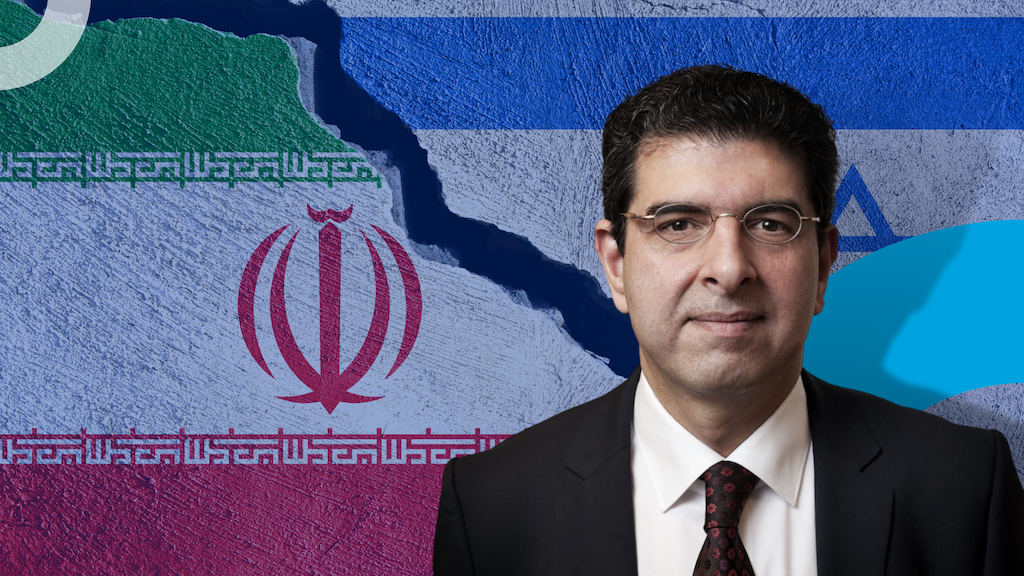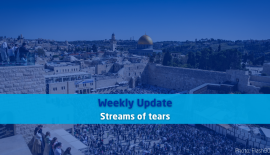Iran and Israel: an interview with Prof. Dr. Afshin Ellian
Since the revolution in 1979, Iran has been promoting the destruction of the Jewish State of Israel. How seriously should we take their threats?
We recently discussed this in the Christians for Israel studio in Nijkerk with Prof. Afshin Ellian, who fled Iran as a political refugee after the revolution in 1979. After studying law in the Netherlands he became Professor of Jurisprudence at Leiden University.
Professor Ellian, welcome. Are the Persians enemies, or friends of Israel?
The current Islamic regime’s hatred towards the Jews is an exception. Historically, there has always been a deep friendship between Persians and Jews. We read in the Old Testament that the Babylonians destroyed Jerusalem, and took millions of Jews into exile in Babylon. The Persians defeated Babylon, and their kings Cyrus and Darius enabled the Jews to return to Jerusalem and restore the Temple.
Later, when Xerxes was king, a Jewish girl Esther became queen of Persia, which was then the mightiest kingdom on earth. So we Persians had a Jewish queen, who is today buried on Iranian territory. Many Iranians do not realize this, and are amazed and very proud when I tell them.
Why is the book Esther important today?
Haman almost succeeded in convincing King Xerxes to destroy the Jewish people in his kingdom. His plan was was totally irrational, but it was very real. The lesson is: what starts as anti-Semitism can end in a planned attempt at genocide of the Jewish people. Europe failed to heed that lesson in the 20th century. The world’s current leaders have the responsibility not to ignore this lesson today.
Why is there so much hatred from Iran towards Israel?
After the 1979 revolution, Ayatollah Khomeini introduced a new project: he invented Israel as an enemy. Israel is of course not a threat to Iran. But Khomeini started to tell the people that Muslims must hate Israel. For example, he called on Muslims worldwide to celebrate the last day of Ramadam as Quds Day [Jerusalem Day].
Inventing the Jews and Israel as an enemy of Iran was a core part of the revolution, and a means to stay in power. Khomeini started killing people who opposed his regime, including those who questioned the war against Iraq. He said: ”We must liberate Jerusalem, and the road to Jerusalem goes through Karbala, in Iraq”. At the time, we did not understand what Khomeni was saying. No-one knew where Jerusalem was, or why it should be liberated. We didn’t hate Jews.
This idea suited Khomeni’s view – shared also by radical Sunni Iranian Muslims – that the Sharia [Islamic law – ed.] forbids a non-Muslim from governing Muslims in what has been Islamic territory. Jerusalem had been, of course, important Islamic territory.
Iran calls Israel the “little Satan” and the USA “the big Satan”. Why does Iran hate the United States?
As leader of Western civilization, the USA presents a real threat to the regime. Many ordinary Iranians simply want freedom, and this has to be suppressed. So in order to stay in power, the regime portrays the West as a threat to Iran’s existence.
What is the Islamic Revolutionary Guard Corps (IRGC)?
The IRGC is an autonomous organization established by Ayatollah Khomeni to enable him to control the country, including the Iranian army. It is his instrument to mobilize the whole Muslim world to revolution. The foreign affairs department of IRGC (“Quds Force”) undermines regimes in other countries that are opposed to its Islamic revolutionary ideology. It works through “proxies”, such as Hezbollah in Lebanon and Syria and many other militias in Syria; Hamas and Palestinian Islamic Jihad in Gaza and West Bank; the Houtis in Yemen; and also organisations in Iraq and Bahrain and elsewhere. These global activities of IRGC are hugely expensive. They are mainly financed by Iran’s sale of oil and gas – its largest export product.
In 2015, a Joint Comprehensive Plan of Action (JCPOA) was agreed between UN Security Council members (US, Russia, China, UK and France) plus Germany – lifting sanctions, in exchange for some sort of oversight regime over Iran’s nuclear project. President Trump withdrew from this regime in 2018. Now, the US Administration and EU leaders are trying to negotiate a new version of the JCPOA agreement with Iran. What is your opinion of these negotiations?
There is nothing wrong in principle with negotiation. But there are many problems with these negotiations.
The first is that the JCPOA agreement is for 15 years. Because the current negotiations are not for a new JCPOA, but for the old JCPOA to be revived, some of those 15 years have already expired. The window for influencing Iran’s nuclear policies is thus very short.
This is a weak agreement that will enable Iran to achieve its revolutionary goals, by providing Iran with hundreds of millions of euros through sale of oil. The JCPOA also lifts sanctions that were imposed by the Security Council on sale of technology to help Iran develop ballistic missiles that can carry nuclear warheads.
Iran is the only UN Member State that has an institutionalized plan to destroy another UN Member State. While there is no evidence at this stage that Iran has plans to make a nuclear weapon, it clearly has plans to develop the capacity to make nuclear weapons. Once it has the capacity to sufficiently enrich uranium, as well as the technology to build ballistic weapons, then it is just a small step to the creation of nuclear weapons that can be used to fulfil its plan to destroy Israel.
The money that Iran will receive will also be used to finance Iran’s proxies in other countries. I don’t know if Iran would ever use nuclear weapons to destroy Israel. They are not stupid. I think they will use nuclear weapons mainly as a threat to help them mobilize and equip its proxies like Hezbollah in Lebanon and Hamas and PIJ in Gaza to attack Israel using smaller weapons.
There is another problem. If Iran develops nuclear bombs and ballistic missiles to deliver them, they will come into the hands of the fanatic elite in Iran. It is then just a question of time before other radical regimes in countries obtain the same capacity. This is deeply dangerous, because all the regimes are highly instable.
It is also naïve to think that making money available to Iran is going to enable development of democracy. The regime in Tehran will not use the money it earns from lifting the sanctions to help its own people. Rather, it will use this money to suppress all opposition.
Does Israel have a right to attack Iranian targets?
The regime in Tehran promotes the killing of Jews and destruction of Israel, and enables regimes in other countries to attack and wipe Israel from the map. Those two facts entitle Israel to defend itself, including attacking targets on Iranian territory that threaten its existence.
Europe has a refugee crisis. Half of the asylum seekers in the Netherlands in 2021 come from Syria and Yemen – both countries where war is instigated and maintained by Iran. Is Iran responsble for the refugee crisis in Europe?
Yes. Without Iran’s interference there would be no wars in these countries. Iran’s support for Assad enabled him to stay in power in 2011/2012, and was responsible for the civil war that erupted in 2012.
Is there hope for peaceful cooperation in the Middle East?
My biggest dream is that the regime in Tehran will stop the aggression against Israel and start solving its own internal problems. On that day, we will discover that we can help Israel and the Palestinians to talk rather than fighting each other. The Abraham Accords give hope for the future.





